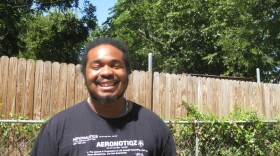In Dallas, homelessness has been in the headlines in recent months. The homeless population is going up and the city has been struggling with solutions. KERA’s Stephanie Kuo has been following this issue for many months, and she talked with Eric Aasen.
Eric Aasen: Let’s talk about this homeless spike...
Stephanie Kuo: Each year homeless advocates do a count of homeless people. The most recent count shows there are about 4,000 people in Dallas and Collin Counties without stable housing. That includes everyone in shelters, on the streets or in some kind of transitional housing.
This is a more than 20 percent increase from last year.
Why the increase?
Well, homeless advocates have a lot of reasons for that. It’s a combination of cost of living here, lack of affordable housing, lack of access to mental health treatment.
And these homeless camps are playing a role?
With these homeless “Tent City” camps, I’ve heard there have been spikes in the populations because the people hear there are social services nearby. At Tent City under I-45 just south of Deep Ellum, churches were handing out clothes, blankets and food.
Tent city was in the news a lot because hundreds of people were in tents under the highway. And that concerned the city. Why did they get involved?
Well it wasn’t safe -- there was a lot of violence. It wasn’t healthy -- there was trash everywhere and even though there were Porta Potties, that wasn’t a long term solution. It became completely unsustainable, so the city decided to shut down Tent City back in May.
But the city worked with agencies to provide services people right?
Of course. Social workers were out at Tent City everyday preparing the residents for the move. They were signing people up for housing. Handing out housing vouchers, encouraging people to find friends/family and emergency shelters.
But that didn’t work for everyone?
No, unfortunately it didn’t. Shutting those camps down really only addressed the symptoms of homelessness and didn’t consider the causes.
There’s a lack of permanent housing in general in Dallas.
People needed IDs and proper paperwork to get into housing, which they didn’t have.
Some don’t feel safe in shelters. Some don’t like the rules and don’t feel as independent. Some have mental illness. Some have physical disabilities. Some have criminal records.
All of these are barriers to finding housing.
And when they shut down Tent City, others sprouted up.
Right, In fact, the Dallas Commission on Homelessness, created by Mayor Rawlings this year, said there are 60 more camps. Smaller, but still. The effect of getting rid of one of these camps without a plan to permanently support and shelter the residents is...they disperse and make new camps.
They closed a camp at I-45 and Coombs Street in July. And this month, they are shutting down another at Haskell and South Hill Avenues. That’s just north of Fair Park under I-30.
The city says part of the solution to this are these tiny houses that have been built near Deep Ellum. The cottages at hickory crossing.
The city and county along with several nonprofits built 50 cottages intended to house the costliest homeless people. These are the people who get put in county jails and use emergency services the most.
The cottages follow the tenets of a “housing first” strategy, which homeless advocates have touted as the only viable solution to homelessness. By being provided a place to live, the homeless then would be able to address issues like health and employment.
Advocates say these 50 cottages aren’t going to solve all of Dallas’s homelessness but it’s a first step.
There’s this group that’s been studying homelessness in Dallas. What have they found, what are they recommending?
The Dallas Commission on Homelessness told the City Council in early August that homelessness needs to be a political and financial priority.
It suggested the city adopt a "housing-first" policy. And it asked the city to help fund efforts to house 600 homeless people, including veterans, within a year. That’s going to cost about $9 million and they want the city to pay for a third of that.
The commission will present its final report to the city council in the next few weeks, so we’ll know more then.
You’ve been following this issue for many months. What are your takeaways?
From what I’ve heard from advocates and local officials, solving homelessness can’t just be the priority of the nonprofits and the politicians. There’s a role for citizens. A lot of it comes down to shifting attitudes about homeless people -- understanding what they need to lift themselves out of homelessness rather than just being frustrated by seeing homeless people.





